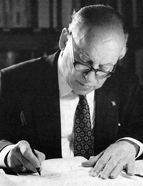

Having acquired a taste for research, he moved away from the essay genre with which he had left Portugal, although he never abandoned his reflection on interpretative perspectives in the field of history. The regional archives of southern France became his main place of work in his spare time, where he found unpublished documentation and, under the guidance of León Bourdon, in 1953, obtained his doctorate from the University of Toulouse with a dissertation entitled A Infanta D. Maria de Portugal (1521-1577) e a sua fortuna no sul de França (The Infanta Maria of Portugal (1521-1577) and her fortune in southern France). With the abundant collection of sources in the archives he frequented, he embarked on the publication of other works such as Portugueses no Estudo de Toulouse (1954) - which would be published in French by the Calouste Gulbenkian Foundation in 1970 - a work in which he compiled a list of all the Portuguese masters and scholars who had attended the University of Toulouse between the 13th and 17th centuries. Among them, he paid special attention to the remarkable figure of António de Gouveia (1510-1566), whose facets as a humanist, philosopher and master of law in various French schools he would develop in later studies and outline in the first exhaustive biography. However, he also studied other humanists and men of learning who participated in 16th-century European culture, such as Diogo de Teive and Francisco Sanchez, with the aim of deepening his understanding of the presence of the Portuguese in the world, one of the dominant themes among his interests. However, he did not neglect leading figures within Portugal who were part of the humanist movement, notably André de Resende and João de Barros. He also collected the names of Portuguese students who attended the Faculdade de Medicina [School of Medicine] in Montpellier in 1957, with an expanded publication in French by the Calouste Gulbenkian Foundation in 1971, entitled Les Portugais à l’Université de Montpellier. XIIe-XVIIe siècles . He later focused on the Castilian universities of Alcalá de Henares and Salamanca, submitting his study on the latter to an academic competition, in a context that will be discussed below. These references clearly show that his interest in the university world was one of the focal points of his studies, with the aim of investigating intellectual and cultural trends, culminating in the publication of a History of Universities in 1983. At the same time as his work at the university that welcomed him, he carried out research in national and foreign archives (Paris, Simancas, London and Madrid), which led to his doctoral thesis O reinado de D. António Prior do Crato, vol. I , (1580-1582), which he presented at the University of Coimbra in 1956 and was approved as a , with a grade of 18.
This work is financed by national funds through FCT - Foundation for Science and Technology, I.P, in the scope of the projects UIDB/04311/2020 and UIDP/04311/2020.
